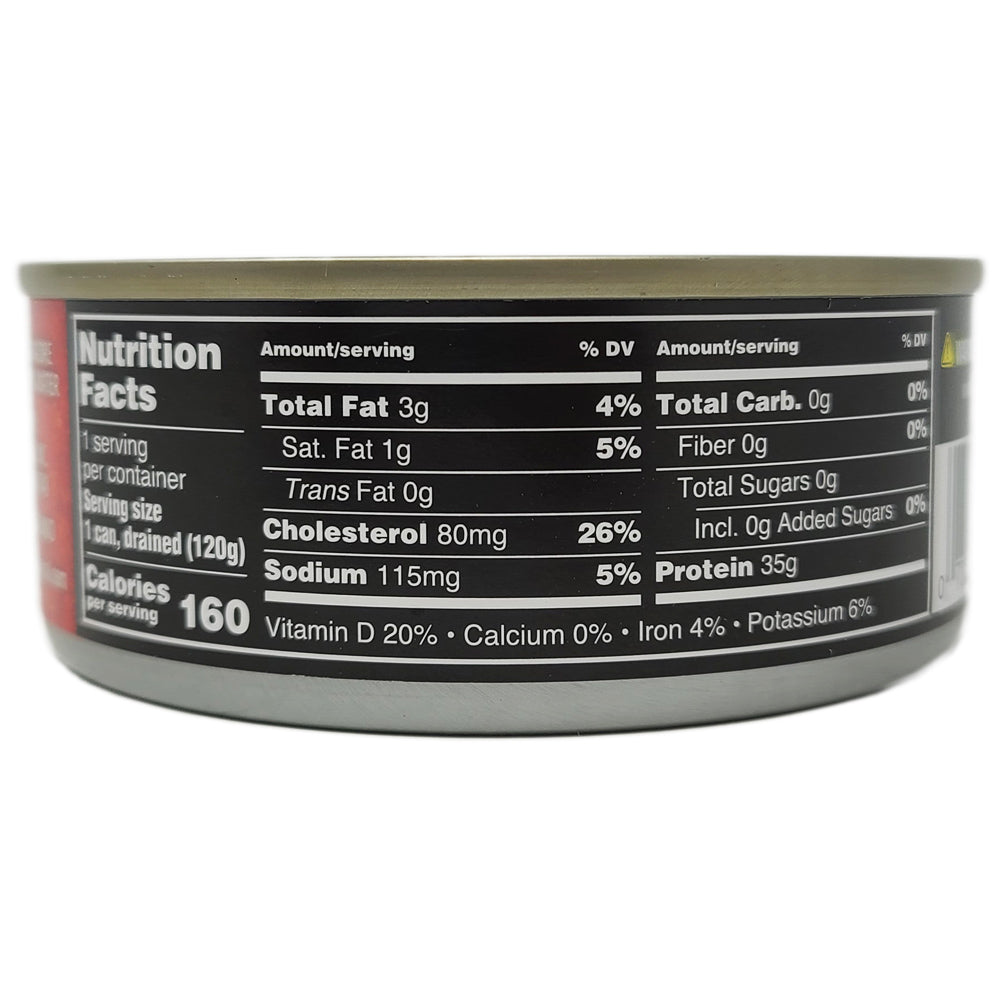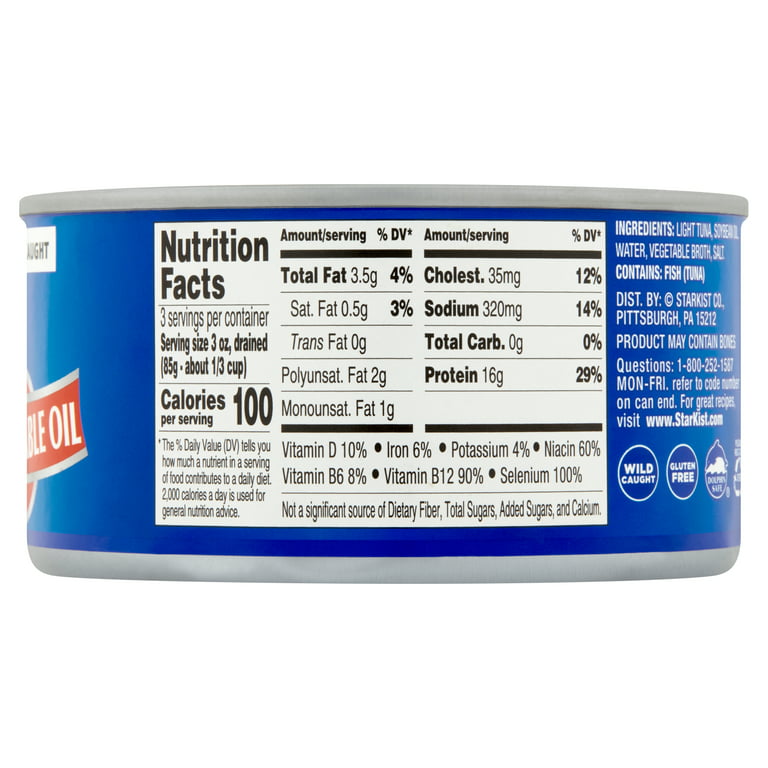A Can of Tuna Nutrition Facts is a healthy choice for a protein-rich meal. It offers good omega-3 fatty acids and a high-quality protein source, promoting heart health.
Tuna also contains essential vitamins and minerals such as vitamin D, selenium, and B that benefit overall well-being. Incorporating canned tuna into your diet can support muscle growth, boost energy levels, and aid in weight management. It is a convenient and versatile option for quick and nutritious meals, making it a popular choice among health-conscious individuals.
Remember to choose water-packed or olive oil-packed varieties for a healthier option.
The Importance Of Knowing Nutritional Information
Understanding the nutritional information of a can of tuna is crucial for making informed dietary choices. The tuna nutrition facts provide essential details about protein, fat, and other nutrients, helping individuals maintain a healthy and balanced diet. Additionally, this knowledge can aid in managing calorie intake and meeting specific dietary requirements.
Knowing the nutritional information of the foods we consume is crucial to maintaining a healthy diet. Understanding exactly what we put into our bodies allows us to make informed choices and ensure that we meet our dietary needs. By familiarizing ourselves with the nutritional facts, we can tailor our meals and snacks to include the necessary vitamins, minerals, and macronutrients. This is particularly important when it comes to canned tuna, as it is a staple in many diets due to its convenience and versatility.
Health Benefits Of Tuna
Canned tuna offers a range of health benefits that make it an excellent addition to a balanced diet. Here are some of the key advantages:
- Rich source of protein: Tuna is packed with protein, essential for building and repairing tissues, supporting a robust immune system, and maintaining healthy hair, skin, and nails.
- Omega-3 fatty acids: Tuna is an excellent source of omega-3 fatty acids, which are essential for our heart, brain, and overall well-being. These fatty acids have been shown to reduce the risk of heart disease and promote brain health.
- Vitamins and minerals: Tuna is rich in essential vitamins and minerals, including vitamin D, B12, selenium, and potassium. These nutrients are vital in various bodily functions, such as maintaining healthy bones, supporting the immune system, and regulating blood pressure.
- Low in calories and fat: Canned tuna is a lean protein option low in calories and fat. This makes it an ideal choice for those looking to lose or maintain a healthy weight.
Nutritional Value Of Canned Tuna
Now, let’s take a closer look at the nutritional composition of canned tuna. Below is a table that highlights the essential macronutrients and micronutrients found in a typical serving of canned tuna:
| Nutrient | Amount per Serving |
|---|---|
| Calories | 120 |
| Protein | 26g |
| Fat | 2g |
| Omega-3 Fatty Acids | 1g |
| Vitamin D | 10% of the Daily Value (DV) |
| Vitamin B12 | 60% of the DV |
| Selenium | 50% of the DV |
| Potassium | 10% of the DV |
As you can see, canned tuna is a nutrient-dense food that provides protein, omega-3 fatty acids, and essential vitamins and minerals. Incorporating canned tuna into your diet can improve your overall health and well-being.

Credit: healthyheartmarket.com
Essential Nutrients Found In Canned Tuna
Canned tuna is a rich source of critical nutrients such as protein, omega-3 fatty acids, and vitamin D, essential for brain and heart health. It’s a convenient and nutritious choice for a quick meal or snack.
Canned tuna is a convenient and versatile ingredient and a nutritional powerhouse. Packed with essential nutrients, it makes a healthy addition to any diet. Let’s explore the vital nutrients that can be found in this popular pantry staple.
Protein Content
Protein is an essential nutrient for body tissue growth, repair, and maintenance. Tuna can contain a significant amount of protein, making it an excellent choice for those who want to increase their protein intake. A typical 3-ounce serving of canned tuna contains around 20 grams of protein! This makes canned tuna an ideal option for athletes, fitness enthusiasts, and those following a high-protein diet.
Omega-3 Fatty Acids
Omega-3 fatty acids are a type of unsaturated fat known for their numerous health benefits. These essential fatty acids are vital in brain function, heart health, and reducing inflammation. Canned tuna, especially albacore and skipjack, are rich in omega-3 fatty acids. Regular consumption of canned tuna can help support your overall well-being and may even lower the risk of chronic diseases.
Vitamins And Minerals
Canned tuna is a good source of vitamins and minerals necessary for a healthy and balanced diet. Here are some essential vitamins and minerals found in canned tuna:
- Vitamin D: Canned tuna is one of the few dietary sources of vitamin D essential for bone health and proper immune function.
- Vitamin B12: This vitamin is essential for producing red blood cells and properly functioning the nervous system.
- Selenium: Canned tuna is rich in selenium, an essential antioxidant mineral supporting thyroid function.
- Potassium is an electrolyte that helps regulate blood pressure and maintain proper fluid balance.
- Iron: Canned tuna is a good source of iron, a mineral necessary for producing red blood cells and oxygen transportation.
You can conveniently boost your intake of these vital vitamins and minerals by including canned tuna in your diet.
Overall, canned tuna is a delicious and versatile ingredient and provides a range of critical nutrients. From its high protein content to omega-3 fatty acids and valuable vitamins and minerals, canned tuna offers numerous health benefits. Incorporating this nutritious food into your meals can support a well-rounded, wholesome diet.
Understanding Serving Sizes And Portions
When understanding serving sizes and portions, paying attention to the recommended serving size and caloric intake of a can of tuna is essential. Let’s delve into the specifics below:
Recommended Serving Size
The recommended serving size for a can of tuna is typically about 3 ounces or 84 grams, which is approximately one-third of the can. This portion balances essential nutrients while keeping caloric intake in check.
Caloric Intake
A can of tuna packed in water typically contains approximately 100-120 calories per serving, making it a low-calorie and protein-rich option for meals and snacks. Considering your daily caloric needs is crucial when incorporating tuna into your diet.
Comparing Different Types Of Canned Tuna
Canned tuna is a popular and convenient source of protein, but not all canned tuna products are equal in terms of nutrition. Various factors, including the type of packing liquid used, salt content, and mercury levels, can significantly impact the nutritional value of canned tuna. Let’s look at these differences to help you make informed choices when selecting canned tuna for your meals.
Water Vs. Oil Packed Tuna
When comparing different types of canned tuna, one crucial factor to consider is whether the tuna is packed in water or oil. While both options provide a good source of protein, there are differences in nutritional value. Water-packed tuna typically contains fewer calories and less fat than oil-packed tuna. On the other hand, tuna packed in oil may offer a richer flavour and potentially higher omega-3 fatty acids due to the oil used. Therefore, it’s essential to consider your dietary preferences and nutritional needs when choosing between water-packed and oil-packed tuna.
Salt Content
The salt content is another crucial aspect to compare when evaluating canned tuna products. Excessive sodium intake can lead to health issues such as high blood pressure and heart disease. Therefore, checking the sodium content on the nutrition label is essential. Opting for low-sodium or no-salt-added canned tuna varieties can help you meet your dietary sodium goals while still enjoying the nutritional benefits of tuna.
Mercury Levels
Mercury is a natural element found in varying levels in different types of fish, including tuna. High mercury consumption can pose health risks, especially for pregnant women and young children. When comparing canned tuna products, it’s essential to be aware of the mercury levels in the different types of tuna. Generally, light tuna varieties, such as skipjack and chunk light, contain lower mercury levels compared to white (albacore) tuna. Choosing tuna with lower mercury levels can help minimize the potential health risks associated with mercury consumption.
Interpreting The Nutrition Label
Discover the nutrition facts of a can of tuna by interpreting the nutrition label. Learn about the calories, protein, and other important information that can help you make informed choices about your diet.
Reading The Nutrition Facts Panel
The nutrition facts panel is your go-to resource when understanding the nutritional value of a can of tuna. This panel provides essential information about the product’s serving size, calories, macronutrients, and other vital nutrients. By reading and interpreting this label, you can make informed choices about incorporating tuna into your diet.
Identifying Additives Or Preservatives
Another crucial aspect of interpreting the nutrition label on a can of tuna is identifying any additives or preservatives that may be present. While tuna is generally healthy, some brands may include preservatives or other additives to enhance flavour, texture, or shelf life. By carefully reading the ingredient list, you can make sure that you are selecting a can of tuna that is free from unwanted additives and preservatives.
:max_bytes(150000):strip_icc()/tuna_annotated1-c1a8a08c5be445ef9329d33e5315f84f.jpg)
Credit: www.verywellfit.com
Healthy Ways To Incorporate Canned Tuna Into Your Diet
Adding canned tuna to your diet is a convenient and affordable way to boost your protein intake. Whether you’re a tuna lover or looking to explore new flavours, incorporating canned tuna can provide various health benefits. Here are some delicious and nutritious ways to enjoy canned tuna:
Tuna Salad Recipes
- Classic Tuna Salad: For a protein-rich salad, mix canned tuna with Greek yogurt, diced cucumbers, cherry tomatoes, and a squeeze of lemon.
- Balsamic Tuna Salad: Combine canned tuna with mixed greens, sliced strawberries, feta cheese, and a drizzle of balsamic vinaigrette for a refreshing summer salad.
Tuna Wraps And Sandwiches
- Tuna Avocado Wrap: For a tasty and filling lunch option, fill a whole-grain wrap with canned tuna, mashed avocado, spinach, and crunchy veggies.
- Tuna Melt Sandwich: For a classic tuna melt, layer canned tuna, sliced tomatoes, and cheddar cheese on whole-grain bread and toast until golden brown.
Tuna Casseroles
- Tuna Pasta Bake: Combine canned tuna with whole-wheat pasta, marinara sauce, and mozzarella cheese for a comforting and nutritious casserole dish.
- Tuna and Veggie Casserole: Mix canned tuna with sautéed vegetables, brown rice, and a sprinkle of Parmesan cheese before baking to perfection.
Potential Risks And Allergies Associated With Canned Tuna
Canned tuna is a convenient and affordable source of protein, omega-3 fatty acids, and various essential nutrients. However, it is crucial to be aware of potential risks and allergies associated with consuming this popular seafood. In this section, we will explore two significant factors regarding canned tuna: mercury contamination and canned tuna allergies.
Mercury Contamination
Mercury is a naturally occurring metal in the environment, including oceans and water bodies where fish like tuna reside. Unfortunately, certain species of tuna, such as albacore and yellowfin, can tend to accumulate higher levels of mercury in their tissues compared to other fish. Therefore, it is crucial to moderate your consumption of canned tuna, especially if you are pregnant or breastfeeding.
To make informed decisions about consuming tuna, it is essential to understand the safety guidelines provided by organizations like the Food and Drug Administration (FDA) and the Environmental Protection Agency (EPA). These guidelines recommend limiting the intake of higher-mercury fish, including certain tuna species, and opting for lower-mercury alternatives. If you have concerns about mercury contamination, consider choosing canned tuna labelled as “chunk light” instead, which generally contains lower mercury levels.
Canned Tuna Allergies
Allergies to fish, including tuna, are relatively common. Those with fish allergies may experience adverse reactions ranging from mild symptoms like itching and hives to more severe reactions such as difficulty breathing and even anaphylaxis. Acknowledging and understanding your food allergies before consuming canned tuna products is essential.
If you suspect that you may have a fish allergy or have experienced allergic reactions, it is advisable to consult with a healthcare professional or allergist. They can help diagnose and manage your allergies and provide personalized recommendations to navigate your diet safely.
When consuming canned tuna, always check the ingredient labels and potential cross-contamination risks if you have fish allergies. Additionally, consider alternative protein and omega-3 fatty acids if canned tuna is unsuitable for your dietary needs.

Credit: www.walmart.com
Frequently Asked Questions Can of Tuna Nutrition Facts
How Much Nutrition Is In A Can Of Tuna?
A can of tuna is packed with nutrition. It is an excellent source of protein, omega-3 fatty acids, and essential nutrients like vitamin D and selenium. It is a healthy choice for a quick and nutritious meal.
Is Eating A Can Of Tuna Healthy?
Eating a can of tuna is healthy as it is high in protein and omega-3 fats.
Is 2 Cans Of Tuna A Day OK?
Yes, eating two cans of tuna a day is generally OK. Tuna is an excellent source of protein and omega-3 fatty acids. However, it’s essential to vary your diet and not rely solely on tuna for all your nutritional needs.
Make sure also to include a variety of other foods in your daily meals.
How Much Protein Is In 4 Oz Of Canned Tuna?
4 oz of canned tuna contains approximately 24 grams of protein.
Conclusion
To sum up, understanding the nutrition facts of a can of tuna is crucial for making healthier food choices. With its protein-packed content and low calories, canned tuna is a convenient and nutritious option for many. With this valuable information, you can make informed decisions about your diet.







